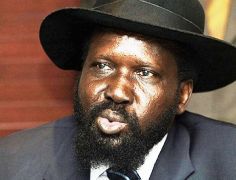Sudan’s Salva Kiir decries slow progress in peace implementation
July 17, 2006 (NAIROBI) — Sudan’s First Vice President Salva Kiir on Monday lamented lack of progress in the implementation of the historic north-south peace agreement, which ended 21 years of conflict in southern Sudan.
 Addressing a news conference in Nairobi, Kiir who is also the president of autonomous southern Sudan, called on the international community to move fast to start implementing specific aspects of the deal.
Addressing a news conference in Nairobi, Kiir who is also the president of autonomous southern Sudan, called on the international community to move fast to start implementing specific aspects of the deal.
“The implementation of the CPA (Comprehensive Peace Agreement) is going slowly than it was expected simply because there is lack of mechanism which was supposed to monitor and to push the parties, ” Kiir told journalists in Nairobi.
“The assessment and evaluation committee even though has been formed, is not the right mechanism to push the parties to implement what they have committed themselves to,” he added.
The Sudan People’s Liberation Movement (SPLM) and Khartoum formed a coalition government after signing a peace deal in 2004 in Nairobi to end more than two decades of north-south civil war.
The deal also ushered in a southern Sudan regional government.
According to Kiir, there were areas where progress has not been made at all in the implementation of the landmark peace deal, which was signed after protracted years of negotiations.
The vice president said there has not yet been any progress on ascertaining the north-south borders, which will determine the division of the oilfields.
“These include the Abyei Boundary Commission. The report which was submitted by the experts has not been implemented and this needs the mediators who participated in the CPA to come along and put pressure on the National Congress Party which has reneged in meeting its obligations,” Kiir said.
Despite the formation of the government of national unity last year, Kiir said progress in several key commissions and committees and other bodies, which were supposed to implement the agreement, are yet to be realized.
Other commissions like the Border and the Petroleum Commissions though they have formed, no progress has been achieved, he said.
“Even though there has been no progress but still we have not lost hope that there would be no progress. It needs the commitment from those who worked day and night to bring peace to the Sudan,” Kiir said.
One of the peace deal’s key tasks is to demarcate a north-south border, which would establish control of oil fields.
Under the agreement, oil revenues from the south would be split roughly equally between the northern and southern governments.
The vice president decried the fact that the international community, which played a crucial role in the success of the peace deal, is merely watching as the situation deteriorates.
He also said the much needed help from the international community has been slow in pushing for the honoring of various aspects and the much needed financial assistance.
“We have not been abandoned but there are areas which we feel the international community has distanced themselves from us which they would have been in a position to intervene,” Kiir said without elaborating.
“Yes, we need the international community’s support so that the CPA can be implemented,” Kiir said but refused to say whether he is comfortable with his current position.
Although the international community welcomed the adoption of the CPA, analysts feel that many problems are preventing its implementation.
That the CPA does not address the problem of the conflict in western Darfur — or the marginalisation of the Beja community in the east – could be another stumbling block.
The vice president said he was leaving for Washington at U.S. President George W. Bush’s invitation.
“I cannot explain why President Bush invited me. Whatever he wants to know from me is something which I cannot talk about,” said Kiir, who heads the former southern rebel movement.
(Xinhua/ST)
